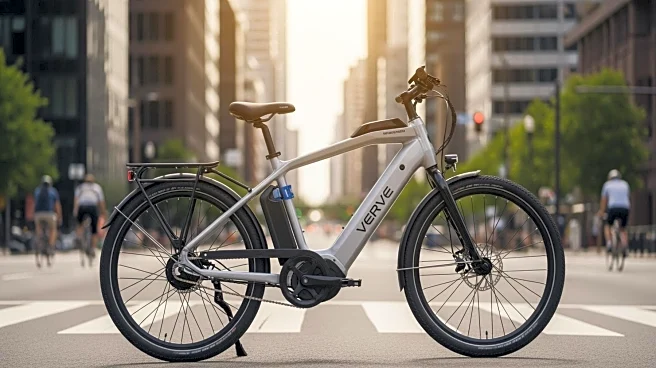What's Happening?
The Cycrown Verve Ebike is gaining attention for its powerful motor and stable ride, particularly suited for urban environments with steep hills and winding streets. The bike's motor allows riders to ascend
hills effortlessly, maintaining speeds of up to 28 miles per hour on flat terrain. However, this power comes at the cost of battery life, with realistic ranges between 25 to 50 miles depending on usage. The bike features wide 26-inch fat tires that provide a smooth ride but reduce agility. The hydraulic disc brakes offer reliable stopping power, and the bike includes practical features like a bright headlight and USB charging port.
Why It's Important?
The Cycrown Verve Ebike represents a significant advancement in urban commuting solutions, offering a blend of power and comfort that can enhance daily travel for city dwellers. Its ability to tackle hills without excessive effort makes it an attractive option for those living in hilly areas. The bike's design prioritizes stability and safety, which could appeal to a broad range of users, including those new to e-bikes. As cities continue to promote sustainable transportation, the Cycrown Verve Ebike could play a role in reducing reliance on cars and public transport, contributing to environmental goals.
What's Next?
Potential buyers of the Cycrown Verve Ebike may consider aftermarket modifications to improve comfort, such as upgrading handlebar grips. As the e-bike market grows, manufacturers might focus on enhancing battery life and agility to meet consumer demands. Urban planners and policymakers could explore incentives for e-bike adoption, further integrating them into city infrastructure. The success of models like the Cycrown Verve could drive innovation in e-bike technology, leading to more efficient and versatile designs.
Beyond the Headlines
The rise of e-bikes like the Cycrown Verve may influence broader cultural shifts towards sustainable commuting. As more people opt for e-bikes, cities might see changes in traffic patterns and infrastructure needs, such as increased bike lanes and charging stations. This trend could also impact the automotive industry, prompting manufacturers to invest in electric vehicle technologies. Additionally, the popularity of e-bikes could encourage healthier lifestyles by promoting physical activity and reducing carbon footprints.











